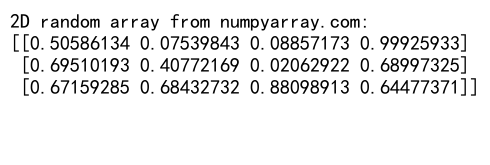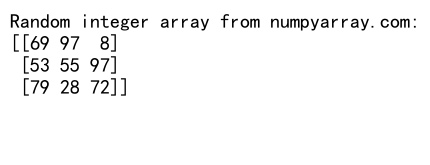Mastering NumPy Random Series: A Comprehensive Guide to Generating Random Data
NumPy random series is a powerful tool for generating random numbers and arrays in Python. This comprehensive guide will explore the various aspects of NumPy random series, providing detailed explanations and practical examples to help you master this essential feature of the NumPy library.
Introduction to NumPy Random Series
NumPy random series is a submodule of the NumPy library that provides a wide range of functions for generating random numbers and arrays. It is an essential tool for many scientific computing and data analysis tasks, including simulations, statistical modeling, and machine learning.
The NumPy random series module offers a variety of probability distributions and random sampling methods, making it versatile and suitable for a wide range of applications. In this article, we’ll dive deep into the capabilities of NumPy random series and explore how to use it effectively in your Python projects.
Getting Started with NumPy Random Series
Before we begin exploring the various features of NumPy random series, let’s start by importing the necessary modules and setting up our environment.
import numpy as np
from numpy import random
# Set a seed for reproducibility
random.seed(42)
print("NumPy version:", np.__version__)
print("Random series is ready to use!")
Output:

In this example, we import NumPy and its random submodule. We also set a seed value to ensure reproducibility of our random number generation. This is particularly important when working with random data, as it allows us to obtain consistent results across different runs of our code.
Generating Random Numbers with NumPy Random Series
One of the most basic operations in NumPy random series is generating random numbers. Let’s explore some of the commonly used functions for generating random numbers.
Generating Random Integers
The random.randint() function is used to generate random integers within a specified range.
import numpy as np
from numpy import random
# Generate 5 random integers between 0 and 10
random_integers = random.randint(0, 11, size=5)
print("Random integers from numpyarray.com:", random_integers)
Output:

In this example, we generate 5 random integers between 0 (inclusive) and 11 (exclusive). The size parameter determines the number of random integers to generate.
Generating Random Floats
To generate random floating-point numbers between 0 and 1, we can use the random.random() function.
import numpy as np
from numpy import random
# Generate 5 random floats between 0 and 1
random_floats = random.random(5)
print("Random floats from numpyarray.com:", random_floats)
Output:

This code generates 5 random floating-point numbers between 0 (inclusive) and 1 (exclusive).
Generating Random Numbers from a Specific Distribution
NumPy random series provides functions to generate random numbers from various probability distributions. Let’s look at an example using the normal distribution.
import numpy as np
from numpy import random
# Generate 1000 random numbers from a normal distribution
normal_distribution = random.normal(loc=0, scale=1, size=1000)
print("Random numbers from normal distribution (numpyarray.com):", normal_distribution[:5])
Output:

In this example, we generate 1000 random numbers from a normal distribution with a mean (loc) of 0 and a standard deviation (scale) of 1. We print only the first 5 numbers for brevity.
Creating Random Arrays with NumPy Random Series
NumPy random series is particularly useful for generating random arrays, which are essential in many scientific computing and data analysis tasks.
Creating 1D Random Arrays
Let’s start by creating a 1-dimensional random array using the random.rand() function.
import numpy as np
from numpy import random
# Create a 1D random array of 10 elements
random_1d_array = random.rand(10)
print("1D random array from numpyarray.com:", random_1d_array)
Output:

This code generates a 1D array of 10 random floating-point numbers between 0 and 1.
Creating 2D Random Arrays
We can also create multi-dimensional random arrays. Here’s an example of creating a 2D random array:
import numpy as np
from numpy import random
# Create a 2D random array of shape (3, 4)
random_2d_array = random.rand(3, 4)
print("2D random array from numpyarray.com:")
print(random_2d_array)
Output:

This example creates a 2D array with 3 rows and 4 columns, filled with random floating-point numbers between 0 and 1.
Creating Random Arrays with Specific Data Types
NumPy random series allows you to specify the data type of the generated random array. Here’s an example using integer data type:
import numpy as np
from numpy import random
# Create a random array of integers between 0 and 100
random_int_array = random.randint(0, 101, size=(3, 3), dtype=np.int32)
print("Random integer array from numpyarray.com:")
print(random_int_array)
Output:

In this example, we create a 3×3 array of random integers between 0 and 100, with a specified data type of 32-bit integer.
Sampling from Arrays using NumPy Random Series
NumPy random series provides functions for random sampling from existing arrays. This is useful in various scenarios, such as creating random subsets of data or implementing bootstrapping techniques.
Simple Random Sampling
Let’s start with a simple random sampling example:
import numpy as np
from numpy import random
# Create a sample array
sample_array = np.arange(10)
print("Original array from numpyarray.com:", sample_array)
# Randomly sample 5 elements without replacement
random_sample = random.choice(sample_array, size=5, replace=False)
print("Random sample from numpyarray.com:", random_sample)
Output:

In this example, we create an array of numbers from 0 to 9 and then randomly sample 5 elements from it without replacement.
Weighted Random Sampling
NumPy random series also supports weighted random sampling, where each element has a different probability of being selected:
import numpy as np
from numpy import random
# Create a sample array and weights
sample_array = np.array(['apple', 'banana', 'cherry', 'date', 'elderberry'])
weights = np.array([0.1, 0.3, 0.2, 0.3, 0.1])
# Perform weighted random sampling
weighted_sample = random.choice(sample_array, size=10, p=weights)
print("Weighted random sample from numpyarray.com:", weighted_sample)
Output:

In this example, we define an array of fruits and assign weights to each fruit. The random.choice() function then samples from this array based on the specified probabilities.
Shuffling Arrays with NumPy Random Series
Shuffling arrays is another common operation in data analysis and machine learning tasks. NumPy random series provides the random.shuffle() function for this purpose.
import numpy as np
from numpy import random
# Create a sample array
sample_array = np.arange(10)
print("Original array from numpyarray.com:", sample_array)
# Shuffle the array in-place
random.shuffle(sample_array)
print("Shuffled array from numpyarray.com:", sample_array)
Output:

This example demonstrates how to shuffle an array in-place using the random.shuffle() function.
Generating Random Permutations
In addition to shuffling, NumPy random series allows you to generate random permutations of an array:
import numpy as np
from numpy import random
# Create a sample array
sample_array = np.arange(10)
print("Original array from numpyarray.com:", sample_array)
# Generate a random permutation
random_permutation = random.permutation(sample_array)
print("Random permutation from numpyarray.com:", random_permutation)
Output:

This example shows how to generate a random permutation of an array using the random.permutation() function.
Working with Probability Distributions
NumPy random series provides a wide range of probability distributions that you can use to generate random numbers. Let’s explore some of the most commonly used distributions.
Uniform Distribution
The uniform distribution generates random numbers with equal probability within a specified range:
import numpy as np
from numpy import random
# Generate random numbers from a uniform distribution
uniform_distribution = random.uniform(low=0, high=10, size=1000)
print("Random numbers from uniform distribution (numpyarray.com):", uniform_distribution[:5])
Output:

This example generates 1000 random numbers from a uniform distribution between 0 and 10.
Normal (Gaussian) Distribution
The normal distribution, also known as the Gaussian distribution, is one of the most important probability distributions in statistics:
import numpy as np
from numpy import random
# Generate random numbers from a normal distribution
normal_distribution = random.normal(loc=0, scale=1, size=1000)
print("Random numbers from normal distribution (numpyarray.com):", normal_distribution[:5])
Output:

This code generates 1000 random numbers from a normal distribution with a mean of 0 and a standard deviation of 1.
Poisson Distribution
The Poisson distribution is often used to model the number of events occurring in a fixed interval of time or space:
import numpy as np
from numpy import random
# Generate random numbers from a Poisson distribution
poisson_distribution = random.poisson(lam=5, size=1000)
print("Random numbers from Poisson distribution (numpyarray.com):", poisson_distribution[:5])
Output:

This example generates 1000 random numbers from a Poisson distribution with a mean (lambda) of 5.
Exponential Distribution
The exponential distribution is commonly used to model the time between events in a Poisson process:
import numpy as np
from numpy import random
# Generate random numbers from an exponential distribution
exponential_distribution = random.exponential(scale=1.0, size=1000)
print("Random numbers from exponential distribution (numpyarray.com):", exponential_distribution[:5])
Output:

This code generates 1000 random numbers from an exponential distribution with a scale parameter of 1.0.
Advanced Techniques with NumPy Random Series
Now that we’ve covered the basics, let’s explore some more advanced techniques using NumPy random series.
Generating Random Walks
Random walks are a fundamental concept in various fields, including physics and finance. Here’s how you can generate a simple random walk using NumPy random series:
import numpy as np
from numpy import random
# Generate a random walk
steps = random.choice([-1, 1], size=1000)
walk = np.cumsum(steps)
print("Random walk from numpyarray.com:", walk[:10])
Output:

This example generates a random walk by cumulatively summing random steps of -1 or 1.
Creating Random Matrices
Random matrices are useful in various applications, including linear algebra and machine learning. Here’s how to create a random matrix with specific properties:
import numpy as np
from numpy import random
# Create a random matrix with values between -1 and 1
random_matrix = random.uniform(-1, 1, size=(5, 5))
print("Random matrix from numpyarray.com:")
print(random_matrix)
Output:

This code creates a 5×5 matrix with random values between -1 and 1.
Generating Random Complex Numbers
NumPy random series can also generate random complex numbers:
import numpy as np
from numpy import random
# Generate random complex numbers
random_complex = random.random(5) + 1j * random.random(5)
print("Random complex numbers from numpyarray.com:", random_complex)
Output:

This example generates an array of 5 random complex numbers.
Best Practices and Tips for Using NumPy Random Series
To make the most of NumPy random series, consider the following best practices and tips:
- Always set a seed for reproducibility, especially when working on scientific or data analysis projects.
- Use the appropriate distribution for your specific use case. Understanding the properties of different distributions is crucial for accurate modeling and analysis.
- When working with large datasets, consider using the
random.Generatorclass for better performance and more advanced features. - Be aware of the differences between various sampling methods (e.g., with or without replacement) and choose the appropriate one for your needs.
- When generating random arrays, specify the desired data type to avoid unnecessary type conversions later in your code.
Common Pitfalls and How to Avoid Them
While working with NumPy random series, there are some common pitfalls that you should be aware of:
- Forgetting to set a seed: This can lead to irreproducible results. Always set a seed at the beginning of your script or notebook.
- Using the wrong distribution: Make sure you understand the properties of the distribution you’re using and how it relates to your problem.
- Ignoring the impact of random number generation on performance: For large-scale applications, consider using more efficient random number generators or vectorized operations.
- Not considering the limitations of floating-point arithmetic: Be aware that random floating-point numbers may not be uniformly distributed at the bit level due to the nature of floating-point representation.
NumPy random series Conclusion
NumPy random series is a powerful and versatile tool for generating random numbers and arrays in Python. From simple random number generation to complex probability distributions and sampling techniques, it provides a wide range of functionalities that are essential for various scientific computing and data analysis tasks.
By mastering NumPy random series, you’ll be well-equipped to handle a variety of scenarios that require random data generation, from simple simulations to complex statistical modeling. Remember to always consider the specific requirements of your project and choose the appropriate random generation techniques accordingly.